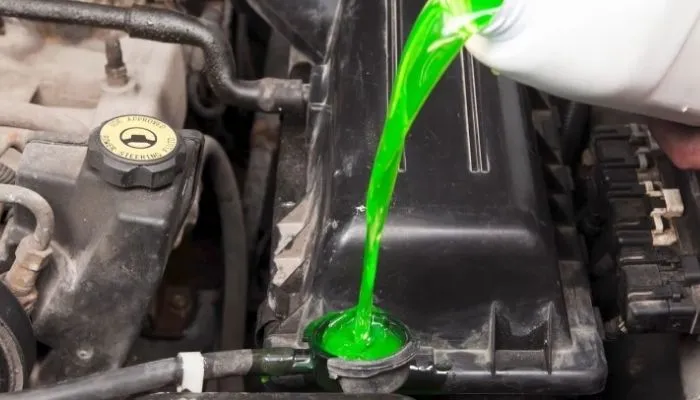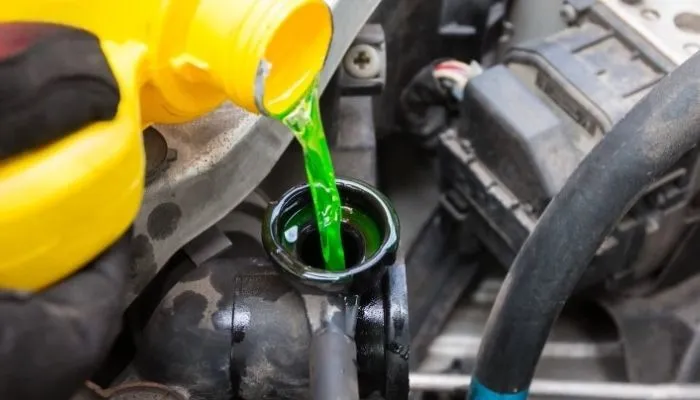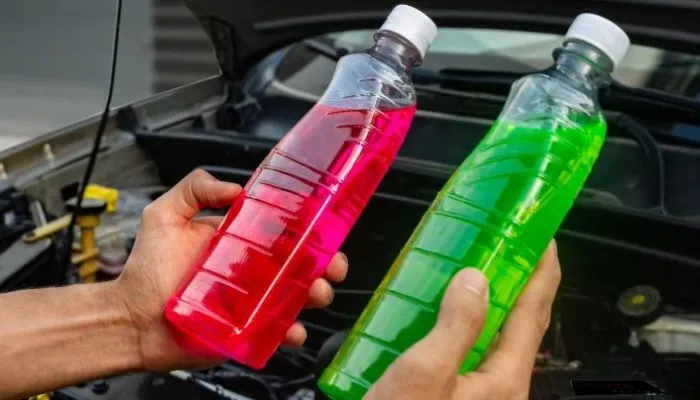Yes, engine coolant and antifreeze are the same. Engine coolant and antifreeze are used interchangeably.
Engine coolant, also known as antifreeze, is a vital component for the proper functioning of a vehicle’s engine. It helps to regulate the engine’s temperature, preventing it from overheating or freezing in extreme weather conditions.
Coolant is typically a mixture of water and ethylene glycol or propylene glycol, along with other additives to enhance its performance and protect the engine from corrosion.
By circulating through the engine and radiator, the coolant absorbs heat and transfers it to the radiator, where it dissipates into the air. It also prevents the formation of rust and scale in the cooling system, ensuring the engine operates at an optimal temperature. Understanding the importance of engine coolant and antifreeze can help maintain the longevity and efficiency of a vehicle’s engine.

What Is Engine Coolant
Engine coolant is a vital component of any vehicle’s cooling system. It helps maintain the ideal operating temperature of the engine, preventing overheating and potential damage. But what exactly is engine coolant? Let’s explore this question in more detail.
Composition
Engine coolant is a specially formulated liquid that primarily consists of a mixture of water and antifreeze. It also contains various additives that enhance its performance and protect the engine components. The most common antifreeze compound used in coolant is ethylene glycol, which has excellent heat transfer properties and prevents freezing in cold temperatures.
In addition to ethylene glycol, engine coolant may contain corrosion inhibitors, pH stabilizers, and other chemicals to prevent rust, scale buildup, and corrosion within the cooling system. These additives play a crucial role in extending the lifespan of the engine coolant and maintaining the overall health of the engine.
Function
The primary function of engine coolant is to absorb and dissipate the excess heat generated by the engine during operation. As the coolant circulates through the engine’s cooling system, it absorbs heat from the engine block and cylinder heads, preventing them from reaching critical temperatures that can lead to engine failure.
The mixture of water and antifreeze in the coolant ensures that it remains in a liquid state even in extreme temperatures. This prevents freezing in colder climates and boiling in hotter climates, providing a stable operating temperature range for the engine.
Furthermore, the additives present in the coolant help protect the various components of the cooling system. Corrosion inhibitors prevent the formation of rust and corrosion on metal surfaces, while pH stabilizers maintain the optimal pH level of the coolant, preventing acidic or alkaline conditions that can damage engine parts.
In summary, engine coolant is a carefully formulated liquid that consists of a mixture of water and antifreeze. It circulates through the engine’s cooling system, absorbing heat and preventing freezing or boiling. The additives present in the coolant protect the cooling system from rust, corrosion, and other damaging effects.

What Is Antifreeze
Antifreeze, also known as engine coolant, is a liquid substance used in a vehicle’s cooling system to regulate the engine temperature and prevent freezing or overheating. It is typically a mixture of water and chemicals that help maintain the proper operating temperature of the engine, especially during extreme weather conditions.
Composition
Antifreeze is usually composed of ethylene glycol or propylene glycol mixed with water and specific additives. Ethylene glycol is the most commonly used base for antifreeze due to its effectiveness at preventing freezing and overheating, while propylene glycol is considered less toxic and is often used in environmentally friendly and biodegradable antifreeze products.
Function
Antifreeze serves several crucial functions in a vehicle’s cooling system, including preventing the engine’s cooling fluid from freezing in cold temperatures, raising the boiling point of the cooling system to prevent overheating in high-temperature conditions, and protecting the metallic components in the cooling system from corrosion and rust.

Difference Between Engine Coolant And Antifreeze
No, engine coolant and antifreeze are not the same. It’s essential to understand the difference between them to maintain the health and performance of your vehicle. The terms are often used interchangeably, but each serves a distinct purpose in maintaining the proper functioning of an engine.
Chemical Makeup
Antifreeze is generally made of ethylene glycol or propylene glycol along with various additives such as corrosion inhibitors and lubricants.
On the other hand, engine coolant is a mixture of antifreeze and water in specific proportions, usually a 50/50 or 70/30 ratio, depending on the climate.
Purpose
The primary purpose of antifreeze is to lower the freezing point of the engine coolant, preventing the liquid from turning into ice in cold temperatures. It also raises the boiling point, reducing the risk of overheating in extreme heat conditions.
Engine coolant, on the other hand, serves as a heat transfer fluid, helping to regulate the temperature of the engine and preventing it from freezing or overheating. It also contains additives to prevent corrosion and rust within the cooling system.
Importance Of Engine Coolant And Antifreeze
The importance of engine coolant and antifreeze cannot be overstated when it comes to ensuring optimal performance and temperature regulation of your vehicle’s engine. Engine coolant and antifreeze are often used interchangeably, but are they really the same thing? Let’s delve into the importance of these two components and how they play a critical role in keeping your engine functioning smoothly.
For Engine Performance
Engine coolant and antifreeze are essential for maintaining the efficiency and performance of your engine. Coolant helps dissipate the excess heat generated by the engine, preventing overheating and damage to vital components.
It also lubricates the water pump and provides corrosion protection for the cooling system, ensuring smooth operation. Antifreeze, on the other hand, prevents the coolant from freezing in cold temperatures, which can lead to engine block cracking or other serious damage.
For Temperature Regulation
One of the main functions of engine coolant and antifreeze is to regulate the temperature of the engine. Coolant absorbs the heat generated by the engine and carries it away to the radiator, where it is dissipated into the surrounding air. This prevents the engine from overheating and maintains its operating temperature within the recommended range.
Antifreeze, as the name suggests, prevents the coolant from freezing in low temperatures, ensuring continuous circulation and optimal engine performance even in cold weather conditions.
Engine coolant and antifreeze are not the same, but they work hand in hand to keep your engine running smoothly. Coolant helps dissipate heat and provides corrosion protection, while antifreeze prevents the coolant from freezing in colder temperatures.
Both are essential for maintaining engine performance and ensuring proper temperature regulation. Regularly checking and maintaining the coolant and antifreeze levels in your vehicle is crucial to prevent engine damage and costly repairs.
Wrapping Up
Engine coolant and antifreeze are often used interchangeably, but there is a difference between the two. While engine coolant is a mixture of antifreeze and water, antifreeze is the specific chemical component that prevents freezing and protects the engine from overheating.
Understanding this distinction is crucial in maintaining the optimal performance and longevity of your vehicle’s engine. So, if you want to keep your engine running smoothly, it’s essential to use the correct coolant or antifreeze based on your vehicle’s requirements.
FAQs
Is Engine Coolant The Same As Antifreeze?
No, engine coolant is not the same as antifreeze, although they are often used interchangeably. Engine coolant is a mixture of antifreeze and water, while antifreeze is a concentrated solution that prevents freezing and overheating in the engine. Antifreeze is typically mixed with water in a specific ratio to create engine coolant.

